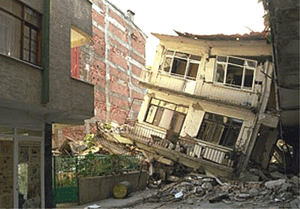|
Earthquake & Emergency Kits
Home-Work-School-Auto
|
|
|
|
 |
Products available
for ordering are
below.
|
| |
|
Prepare
a Home Earthquake Plan
|
|
|
-
Choose a safe place in every room--under a sturdy table or desk or
against an inside
wall where nothing can fall on you.
-
Practice
DROP, COVER, AND HOLD ON at least twice a year. Drop under a
sturdy desk or table, hold on, and protect your eyes by
pressing your face against your arm.
If there's no table or desk nearby, sit on
the floor against an interior wall away from windows, bookcases, or tall furniture that
could fall on you. Teach children to DROP, COVER, AND HOLD ON!
-
Choose
an out-of-town family contact.
-
Consult
a professional to find out additional ways you can protect your
home, such as bolting the house to its foundation and other
structural mitigation techniques.
-
Take
a first aid class from your local Red Cross chapter. Keep
your training current.
-
Get
training in how to use a fire extinguisher from your local fire
department.
-
Inform babysitters and caregivers of your plan.
|
|
Eliminate Hazards, Including... |
|
|
-
Bolting bookcases, china cabinets, and other tall furniture to wall
studs.
-
Installing
strong latches on cupboards.
-
Strapping
the water heater to wall studs.
|
|
Prepare
a Disaster Supplies Kit For Home and Car, Including...
|
|
|
-
First
aid kit and essential medications.
-
Canned
food and manual can opener.
-
At
least three gallons of water per person.
-
Protective
clothing, rainwear, and bedding or sleeping bags.
-
Battery-powered
radio, flashlight, and extra batteries.
-
Special
items for infants, elderly, or disabled family members.
-
Written
instructions on how to turn off gas, electricity, and water if authorities advise you to do so. (Remember,
you'll need a professional to turn natural gas service back on.)
-
Keeping
essentials, such as a flashlight and sturdy shoes, by your
bedside.
|
|
Know What to Do When the Shaking Begins |
|
|
-
DROP,
COVER, AND HOLD ON! Move only a few steps to a nearby safe place.
-
Stay
indoors until the shaking stops and you're sure it's safe to
exit. Stay away from windows. In a high-rise building,
expect the fire alarms and sprinklers to go off during
a quake.
-
If
you are in bed, hold on and stay there, protecting your head with
a pillow.
-
If
you are outdoors, find a clear spot away from buildings, trees,
and power lines.
Drop to the ground.
-
If
you are in a car, slow down and drive to a clear place (as
described above).
Stay in the car until the shaking stops.
|
|
Identify
What to Do After the Shaking Stops |
|
|
-
Check yourself for injuries. Protect yourself from further
danger by putting on long pants, a long-sleeved shirt, sturdy shoes,
and work gloves.
-
Check others for
injuries. Give first aid for serious injuries.
-
Look for and extinguish small
fires. Eliminate fire hazards. Turn off the gas if you smell gas or think it's leaking. (Remember,
only a professional should turn it back on.)
-
Listen to the radio for
instructions.
-
Expect aftershocks.
Each time you feel one, DROP, COVER, AND HOLD ON!
-
Inspect your home for
damage. Get everyone out if your home is unsafe.
-
Use the telephone only to
report life-threatening emergencies.
|
|
Courtesy of the American Red Cross |
|
|
|
|